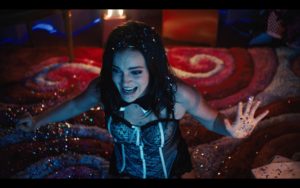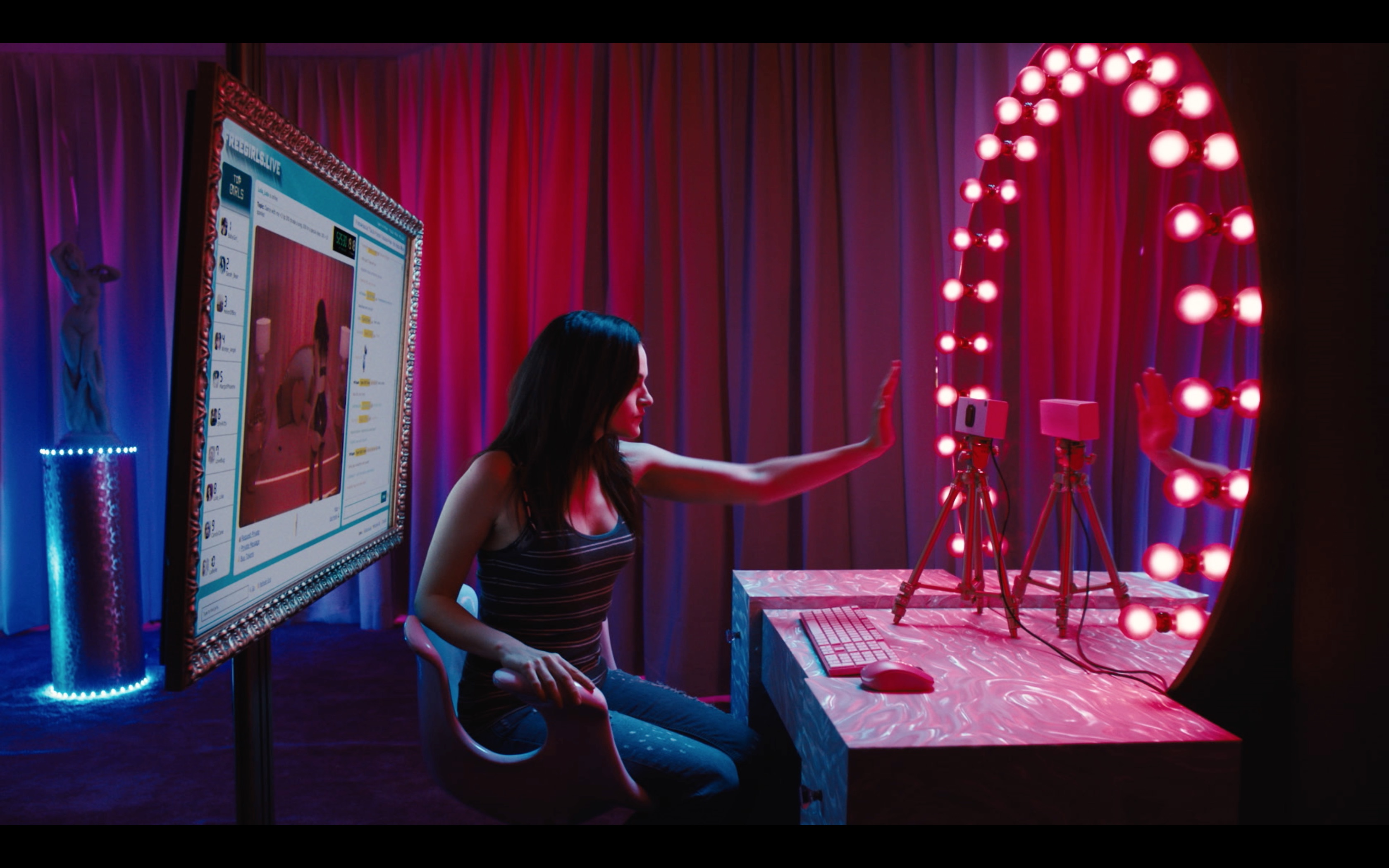“I made a joke about how I hoped I wouldn’t die because someone would find me in my apartment like this,” Isa Mazzei recalls, taking a break from drafting her next screenplay to reminisce about the origins of her first. “And a couple people started talking about how it would be funny if I died, how they’d pay extra to see that. So something clicked in my brain: I’m going to engage with that psychology.”
The “like this” in question was a particularly intense show Mazzei staged in her days as a cam girl; the anonymous assholes were hecklers in her otherwise supportive audience. But as a performer before a live audience (albeit, one hidden miles behind the lens of her webcam), following comments and tracking her tips in real time was as much a part of the job as conceiving fresh ideas for shows—and that meant exposure to the ugliest the Internet had to offer.
“I would get bullied online often,” she recalls. “I have no doubt that if I was in a room with those people and asked, ‘Do you actually want to watch me die?’ they would say no. But there’s something about being online that makes us dehumanize each other.”
From that genesis, Mazzei first began crafting a cam show in which she would directly confront the mob mentality, playing chicken with a bloody outcome if enough online viewers rooted for it. But over time, alongside her longtime friend and creative collaborator Daniel Goldhaber, the scenario came to life in front of a different camera altogether.
The first six minutes of Cam, the horror-thriller Mazzei wrote and co-created with Goldhaber, are among the finest prologues to a genre movie in years; we meet camgirl Alice (a revelatory Madeline Brewer) in her eye-popping home studio, the “Pink Room,” and learn the perimeters of her job as she performs as her online alias “Lola.” We also meet Cam’s great supporting character: the Internet, personified as an endless Greek chorus of suggestive emojis and chirping push notifications. When the comments grow hostile, Lola’s flirtatious ebullience turns to ferocious smolder, until she finally stakes her territory by…well, it’s just one of many surprises found in one of the best movies of the year.
“The goal of the project, where it began, was to tell a mainstream story where an audience would be rooting for a sex worker,” Mazzei explains. “And to tell a story that subverted the stereotypical morality tale.” In other words, Alice is neither a miserable, imprisoned damsel nor a reckless, directionless trainwreck, despite stigma around her chosen profession. She’s fulfilled, ambitious, perfectly happy with her work and her community, and driven to break the Top 50 profiles on her platform.
“The goal of the project was to tell a mainstream story where an audience would be rooting for a sex worker, and to tell a story that subverted the stereotypical morality tale.”
While she and Goldhaber developed the story, Cam’s supernatural central conflict came to her—literally, and unfortunately. “I woke up to a text from someone saying there were screen captures of me on PornHub. I went online and saw all these pirated screen captures of my show, not attributed to me in any way. They had scrubbed out my watermark and renamed it—the one I remember was “frizzy-haired pale girl”—and it was a really alienating experience to feel completely separated from my own image. To watch the view count on that go up and know that those people watching had no idea who this girl really was, was very dehumanizing. And very scary.”
From the “pale girl” came Alice’s worst nightmare: her loss of agency, manifested in “Lola,” the mysterious online doppelgänger who locks her out of her account and breaks her rules of conduct one-by-one, whipping Alice’s life into chaos.
The control Alice fights to reclaim is present throughout Cam’s craft in another major way: an intentional removal of the male gaze—in critical theory, the act of depicting and observing the world through the objectifying lens of heterosexual masculinity, often considered an established default in media. If Mazzei and Goldhaber were going to do justice to a sex positive, empathetic portrayal, they knew they would need to create a perspective as unbiased as Alice’s unblinking webcam. No small task for any film, especially not in a genre (horror) known for punishing sex or ogling women.

Isa Mazzei / photo by Caitlin Fullam
Mazzei offered a few thoughts on how they did it, and how other projects can—and should. Firstly: Hire women, and listen to them. Mazzei recognizes that “A Film by Isa Mazzei and Daniel Goldhaber” is an unconventional credit, even for an unconventional film. “We are totally challenging the traditional idea of authorship and who ‘makes’ the film,” Mazzei explains. Though Goldhaber is ultimately credited as director and Mazzei as screenwriter, “I was involved in every aspect of production and preproduction,” and for matters of authenticity and comfort with the actors, she directed several scenes, as well—including working with the actors on the intense, sensory-overloading “Vibratron” cam sequence. Along with Mazzei’s co-authorship with Goldhaber, women played major roles throughout the film’s production, including director of photography Katelin Arizmendi. “I don’t want people to think it’s just hiring women and then not listening to them,” Mazzei says.
A second point: Every choice should be a conversation. “If you want to make films that confront the male gaze,” she continues, “they need to be willing to have a constant dialogue, open communication, and create environments where people feel like they can stand up for themselves and say, ‘I don’t want to be nude in this scene,’ or, ‘That shot is problematic,’ and where anyone on set feels empowered to make that call. I think when you’re really collaborative, that’s when you back the best art.”
“There’s a legacy of problematic approaches, things like icing actresses’ nipples…it still took a second for me to be like, ‘Wait! What are we doing?’ It’s so easy to fall back on these expected practices in filmmaking.”
The male gaze has been institutionally held in cinema since the days of The Great Train Robbery (1903), so many standards and practices on set are overdue for reconsideration—including a long-standing approach to the female body that might surprise even lifelong cinephiles. “There’s a legacy of problematic approaches, things like icing actresses’ nipples,” Mazzei says. “In the Vibratron scene, a call went up on set to get the ice for [Brewer’s] nipples. And it still took a second for me to be like, ‘Wait! What are we doing?’ We all had this moment: Of course we’re not going to do that. But it’s so easy to fall back on these expected practices in filmmaking. Sometimes it takes somebody on the outside to say, ‘That’s actually problematic.’”
In early conversations with Brewer about the role, Mazzei says, “She just looked at me and she said, ‘Isa, I would be honored to play a sex worker.’ That was the most moving thing she could have said.” Thus began one of the most impressive onscreen performances of the year—perhaps, in years—as Brewer takes on the roles of Alice, Lola, and “Lola,” sometimes all in the same shot. It’s an Olympic-level triathlon of a performance, intimate and expressive, 100 percent committed and utterly fearless. “She really opened herself up to say, ‘I think Alice wants to be naked in this scene because of this, and I think she should be clothed in this scene because of this.’ It was always coming from a place of Alice’s psychology and character, which is why I think the nudity plays so well in the film and doesn’t feel gratuitous.” Mazzei also points out, in a flourish especially radical for a film evoking so much sexuality: “The only moment of suggested orgasm is at the end of the Vibratron scene. The moment she feels genuine pleasure is because her ambition is being fulfilled. I wanted to do that because female sexuality in film is so often used as a tool to either validate a male experience or gratuitously play to an audience. I wanted that moment to be personal to Alice.”

Madeline Brewer in “Cam”
In the film, thousands of men watch Alice’s cam shows without conflict, although “the majority of men in my movie are actually very respectful,” Mazzei says. “That’s why you don’t see them!” But when the digital clone starts breaking the rules, so do two of Alice’s most inappropriate clients: Barney and Tinker, who invade her privacy in the real world. “Barney is a very clear stand-in for male entitlement over the female body. He believes they owe him everything, that he has a right to overpower them because he pays them. Tinker is a little different…someone who is willfully misreading signals. He is so caught up in the fantasy of the performance, he’s not able to recognize the difference between the performance and where those boundaries are, without taking her agency into consideration, never once asking, “What does she want?” Taking the male gaze out from behind the camera can also mean dramatizing its consequences in front of it: “The main takeaway needs to be, respect women and listen to their boundaries.”
With word-of-mouth spreading like a virus, Mazzei and Goldhaber are already hard at work on their next genre thriller for Cam producer Blumhouse, and Mazzei will discuss her cam girl background with more humor than horror in her memoir, due out November of next year. In both, she’ll continue to challenge patriarchal perceptions. “It’s exhausting, but it’s worth it,” she says. “More than worth it, I think it’s necessary. That’s where we are now.” Check out Cam, now on Netflix, and see for yourself. FL







